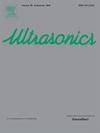Ultrasonic detection of wrinkles in composites with gradual phase shift migration
IF 3.8
2区 物理与天体物理
Q1 ACOUSTICS
引用次数: 0
Abstract
Fiber reinforced polymer composites (FRPs) are essential for various industrial fields, but wrinkles inside will greatly reduce their mechanical properties. Full-matrix capture (FMC) is a popular data structure for ultrasonic phased array imaging in composites. However, such structure may lead to data redundancy and noise interference. In this paper, a gradual phase shift migration (GPSM) is proposed to characterize wrinkles accurately. The gradual matrix is formed from the expansion along principal diagonal of FMC data with equal transmitter–receiver spacing. The dilemma between lateral resolution and sidelobe interference intensity is resolved to obtain the best imaging resolution by selecting an appropriate data structure. Moreover, to address the inconsistency of ultrasound velocities at different propagation directions caused by anisotropy of composites, the angle-dependant velocity is corrected by backwall reflection method (BRM). Based on gradual matrix data, the velocity-corrected phase shift factor is applied in the GPSM algorithm to obtain the wavefield at different depths through a layer-by-layer wavefield extrapolation. The experimental results indicate that four wrinkles can be detected in thick hybrid carbon-glass FRPs based on GPSM, with angle detection errors less than 6%. Furthermore, the GPSM method combining partial diagonal data takes only 0.5 s, achieving 60% improvement in computational efficiency compared to that with all gradual matrix data. The proposed method can be applied for high-resolution imaging of various multilayered medium in real-time.
超声波检测复合材料中的褶皱与渐进相移迁移。
纤维增强聚合物复合材料(frp)在各种工业领域都是必不可少的,但其内部的褶皱会大大降低其力学性能。全矩阵捕获(FMC)是复合材料中超声相控阵成像的常用数据结构。然而,这种结构可能导致数据冗余和噪声干扰。本文提出了一种渐进相移偏移(GPSM)方法来精确表征皱纹。在收发间隔相等的情况下,对FMC数据沿主对角线展开形成渐变矩阵。通过选择合适的数据结构,解决了横向分辨率和旁瓣干涉强度之间的矛盾,获得了最佳成像分辨率。此外,为了解决复合材料各向异性引起的不同传播方向超声速度不一致的问题,采用后壁反射法(BRM)对角度相关速度进行校正。基于渐进式矩阵数据,将速度校正相移因子应用到GPSM算法中,通过逐层波场外推得到不同深度的波场。实验结果表明,基于GPSM的厚碳-玻璃复合frp可检测出4种褶皱,角度检测误差小于6%。结合部分对角线数据的GPSM方法计算时间仅为0.5 s,计算效率比全部渐进式矩阵数据提高60%。该方法可用于多种多层介质的实时高分辨率成像。
本文章由计算机程序翻译,如有差异,请以英文原文为准。
求助全文
约1分钟内获得全文
求助全文
来源期刊

Ultrasonics
医学-核医学
CiteScore
7.60
自引率
19.00%
发文量
186
审稿时长
3.9 months
期刊介绍:
Ultrasonics is the only internationally established journal which covers the entire field of ultrasound research and technology and all its many applications. Ultrasonics contains a variety of sections to keep readers fully informed and up-to-date on the whole spectrum of research and development throughout the world. Ultrasonics publishes papers of exceptional quality and of relevance to both academia and industry. Manuscripts in which ultrasonics is a central issue and not simply an incidental tool or minor issue, are welcomed.
As well as top quality original research papers and review articles by world renowned experts, Ultrasonics also regularly features short communications, a calendar of forthcoming events and special issues dedicated to topical subjects.
 求助内容:
求助内容: 应助结果提醒方式:
应助结果提醒方式:


